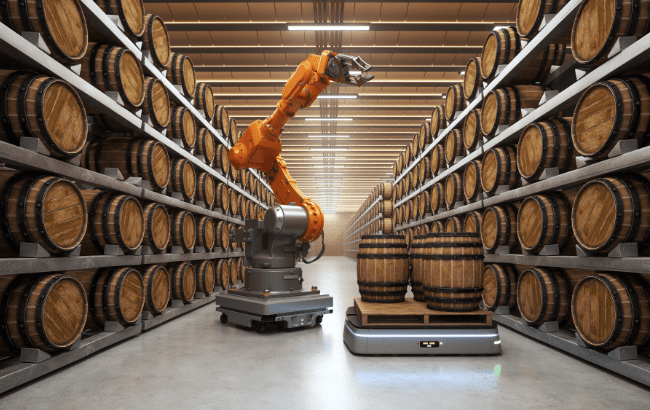Should the spirits sector embrace technology?
By Ted SimmonsWith an array of software available, the spirits industry has to decide whether to embrace advancements in technology or not.

Creating a spirit, or better yet, sharing one, can be an emotional experience. The industry is, after all, about human connection, and traditions passed down through generations. For these reasons and more, the spirits industry has been slow to adopt AI and other recent technology, though a number of software platforms and start-ups have emerged to help people at all levels of the supply chain achieve greater efficiency.
During a discussion at ProWein in March, a panel of AI experts agreed that the beverage alcohol industry was behind other sectors in its embrace of tech, with Danny Cooper, chief information and digital officer at Virgin Wines, estimating that on an e-commerce level, the industry is 10 to 15 years behind.
While some of that resistance is universal – all change takes some degree of time to accept – the spirits industry specifically has found itself slower to adopt these tools than say retail, logistics, and agriculture, for reasons both emotional and economical. While there may have been resistance to these tools on the basis of change, current market conditions require reassessing the entire lifespan of a product.
“If you’ve got an industry where you’re continuously growing, you don’t need to invest as much in technology or invest in new tools,” Ed Dobbles, chief analytics officer for Overproof says. “Now that there are more structural challenges in the marketplace, you see a greater reliance on the use of technology and analytics than you have before. There’s just greater competition.”
Transform procedures
Before joining Overproof, which was founded in 2018, and offers a single platform for brands to track sales and develop market strategies, Dobbles served as vice-president of advanced analytics at Diageo. He compares AI with Microsoft Excel or email in terms of its capability to transform operational processes and the initial attitudes towards its implementation. In hindsight, these products seem commonplace, but at the time of their inception, there was a learning curve with them as well. “I would expect that data and analytics and AI will be embedded in every process, and it’s going to change the nature of how people work,” he says. “Five years from now, there’s going to be a wider range of tools. They’re going to be more mature, people are going to have a better idea how to use them efficiently, and it’s going to be a requirement.”
In 2014, Josh McKinney co-founded Ekos, a business management software for craft beverages that allows for maximum efficiency and transparency. In 2025, he started Craftline, an AI-powered procurement platform designed for beverage producers.
McKinney says if there is ignorance in the industry regarding tech, it isn’t necessarily wilful, and that he has seen a desire from producers to leverage technology, but that without the right personnel in place, new products can often get left to the side. Craftline automates purchase orders, and allows craft producers to easily shop for goods in bulk. It can be as simple as eliminating an email chain with a grain supplier or anticipating needs based on previous data and information.
“[Producers] have been more accepting of it than I expected,” McKinney says of implementing AI-led automation into their everyday processes. “The market’s rough, and they need to save costs. If that’s making existing employees more efficient with their time, if it is replacing head count in some ways, they’re trying to evaluate pieces in the business for efficiencies to stay alive and get to the other side of this downturn. If it is just a couple more months, quarters, or 30 years, you’ve got to stay viable, and, sometimes, it’s uncomfortable.”
There may be some consolidation, Dobbles concedes, but, at the same time, these analytic tools can give a craft brand the equivalent of a small research team to determine which products to push in which markets and when to anticipate reorders. There is an undeniable fear that AI will replace jobs, but Dobbles says the real impact will be in allowing top performers to spend their time more wisely, while enabling people in the supply chain to do more with less.
“The best distributor sales people that I’ve ever met, I could not AI them,” Dobbles says. “They just intuitively knew things about the industry. They knew things about their customers. But think about your struggling sales reps, or that sales rep that you just hired out of college. It’s going to raise the floor for your entire sales force.”

Beyond the sales and distribution side, AI software can help producers and retailers manage inventory, and help consumers make more informed decisions based on predictive analytics. Preferabli, founded in 2010, does precisely that, providing discovery recommendations using a comprehensive database of information.
“There are thousands of spirits in the world. No one can taste every single one, whether they’re a consumer or a buyer,” Preferabli co-founder and CEO Pam Dillon says. “They’ve come to rely on [our] software the way they rely on software for many other parts of their lives. Software is very good at solving a paradox of choice, especially with little-known spirits or barrel releases.”
Dobbles recalls that on his 21st birthday, he ventured out to buy his then fiancé a nice bottle of wine and, intimidated the range available, chose Boone’s Farm, known for its affordability. “And that scarred me for life,” he says. “But think about how AI can make that an unintimidating conversation.”
As well as helping brands optimise their processes, providing a digital record and improving internal systems can also help manage inventory and prevent future loss or potential embarrassment. Proof 8 CEO Rob Hollands points to a recent BBC TV documentary titled Hunting the Whisky Bandits as helping to expose the lack of transparency in cask ownership, and the vulnerability that can cause. Keeping advanced records isn’t just about achieving peak efficiency, it also mitigates risk.
“The continued reliance on analogue, and outdated records of ownership has left the system open to fraud, loss and duplication, causing uncertainty for owners about the existence and whereabouts of their casks,” Hollands says. Proof 8 was founded in 2021, and is using Web3 technologies to digitalise the entire spirits supply chain. “This is not tech for tech’s sake,”Hollands says, “but a genuinely useful solution to a very real problem that’s facing producers, brands and most importantly, consumers.”
The Foundry Vault, a third-party maturation facility in Northern Ireland, previously relied on manual spreadsheets to track thousands of casks across multiple sites. Since implementing Proof 8’s Digital Deeds system, inventory checks take minutes instead of days, and capacity has increased by 20% as space has been optimised.
This is the full scope of AI and other software options. At every step of the spirits supply chain, there is a task that can be streamlined, and a more informed choice that can be made. As Dobbles notes, consumers can still expect to find their preferred bottle on the shelf, but the ways in which it gets there can be improved upon. “This technology is going to be woven into the way that we do our business, but it’s not going to change the nature of the business,” he says. “What’s going to change is how we get that done, how we get that bottle to the consumer, how we manage the process from moving that Scotch whisky from Scotland to your local back bar. AI and technology is going to get better at that, which will probably make us more efficient, and could make us more profitable as an industry.”
Ease of use
It will take the busy work out of the chain, Dobbles notes, but the final 10% to 20% of the task will still need to be done by someone with knowledge of the industry. As McKinney puts it, most brewers, distillers, and wine makers got into the business to get off the computer, so success will come in pairing efficiency with ease of use. Whether that means bringing in a director of operations who understands the usefulness of these software platforms or empowering a workforce to pair them with their own knowledge and experience depends on each business’s needs and budget, but the options are there and the need to adapt is critical.
“AI can help bring up insights from the batches and sales and data and everything else, but it can’t replace the head distiller or the producer and what they are,” McKinney says. “It can help improve their margins and make them more efficient. To me, that’s where we should all be leaning in, to allow more time for the story, and the storytelling and the pieces that make each of these makers what they are.”
Industry insights
What inefficiencies in the spirits supply chain do current advancements in technology help to address?
Rob Hollands – CEO, Proof 8
“Uncertainty, geopolitical risks, security concerns, tariff pressures, and a general lack of visibility are impacting all businesses – from small producers to global drinks companies. With this, there has never been a higher demand for solutions that facilitate better planning, increased efficiency and a visibility of every element of a product’s journey from creation, through distribution and into the hands of consumers. The Proof 8 platform helps distilleries track every aspect of production, from malt intake to bottling – including optimising yields, reducing maturation losses and ensuring the quality and consistency of every product. We support warehouses to better utilise space, monitor environmental factors and track movements of assets. And we help organisations with our easy-to-implement and intuitive platform that digitalises every aspect of operations to generate valuable real-time data that informs better business decisions.”
What is keeping spirits brands from embracing new technology?
Rob Hollands – CEO, Proof 8
“The primary obstacle is the perceived tension between innovation and tradition. Many producers fear that digital tools may compromise the artisanal integrity of their craft. However, our experience shows that technology, when implemented thoughtfully, protects and enhances the value of craftsmanship. It reduces the administrative burden, preserves precise provenance records and supports consistent quality across production.”
Where is the spirits industry relative to other sectors in embracing technology?
Pam Dillon – CEO, Preferabli
“While the spirits industry has been slower to adopt technology in the past, it’s now experiencing digital transformation as businesses in every sector of the world economy are quickly adopting digital solutions in buying and selling everything. Early adopters in the spirits industry will be well rewarded. Increasingly, the spirits industry is realising the need to create a digitally-driven supply chain that starts with understanding what the consumer wants. Consumer preferences of all kinds are driving the need for change – the desire for rich content and discovery, the call for sales and marketing tools, and the necessity for true data intelligence.”
Related news
Kentucky Bourbon Trail adds 10 new stops
